IWAAS delegation visited Bahrain, Qatar and Iran for academic exchanges
A delegation of Institute of West-Asian and African Studies (IWAAS), Chinese Academy of Social Sciences (CASS), led by Professor Li Xinfeng, General-Director of IWAAS, visited Bahrain, Qatar and Iran from June 23 to July 2, 2024 for academic exchanges. The delegation members include Professor Li Xinfeng, Yu Guoqing, research fellow of the IWAAS; Li Yujie, associate research fellow of the IWAAS; and Zhang Mengying, associate research fellow of the IWAAS. The delegation aimed to conduct research for CASS National Global Strategy Think Tank research project on “Belt and Road Cooperation in Science and Technology Innovation between China and Middle Eastern Countries”.
The IWAAS delegation visited Bahrain from June 24 to June 25, 2024. They co-hosted a seminar on "China-Bahrain Cooperation in Energy and Technology" with the Bahrain Center for Strategic, International, and Energy Studies (DERASAT). Professor Li Xinfeng made a speech, highlighting Chinese President Xi Jinping's keynote speech at the opening ceremony of the 10th Ministerial Conference of the China-Arab States Cooperation Forum. He expressed the hope for strengthen China-Bahrain cooperation in energy, technology, think tanks and other fields. Hamad Bbrahim Al-Abdulla, Executive Director of the DERASAT made an introduction to the DERASAT, saying that Bahrain is willing to strengthen cooperation with China in energy transition, technology innovation, artificial intelligence and other areas. Nayla Ali AI-Khalifa, Director of Communications and Knowledge Management at DERASAT; Omar Ahmad Al-Ubaydli, Director of Research at DERASAT and other members of the IWAAS delegation also delivered speeches at the seminar. The scholars exchanged views on boosting China-Bahrain cooperation in energy, technology, agriculture and finance, and discussed China's role in facilitating peace and stability in the Middle East and North Africa. More than 20 experts and scholars attended the seminar.

Group Photo (The 6th from the left: Hamad Bbrahim Al-Abdulla, Executive Director of the DERASAT)
During their stay in Bahrain, the delegation also visited the Chinese Embassy in Bahrain, and met with Chinese Ambassador to Bahrain Ni Ruchi who briefed on Bahrain's political, economic and social development, and expressed the hope to enhance academic exchanges and mutual understanding between think tanks of China and Bahrain. Professor Li Xinfeng explained that the purpose of the visit is to conduct survey on Belt and Road Cooperation in Science and Technology Innovation between China and Middle Eastern Countries. He made an introduction of the IWAAS, adding that the IWAAS is willing to foster communication and cooperation with think tanks in Bahrain through joint research and academic exchanges, and to bring closer China-Bahrain ties.
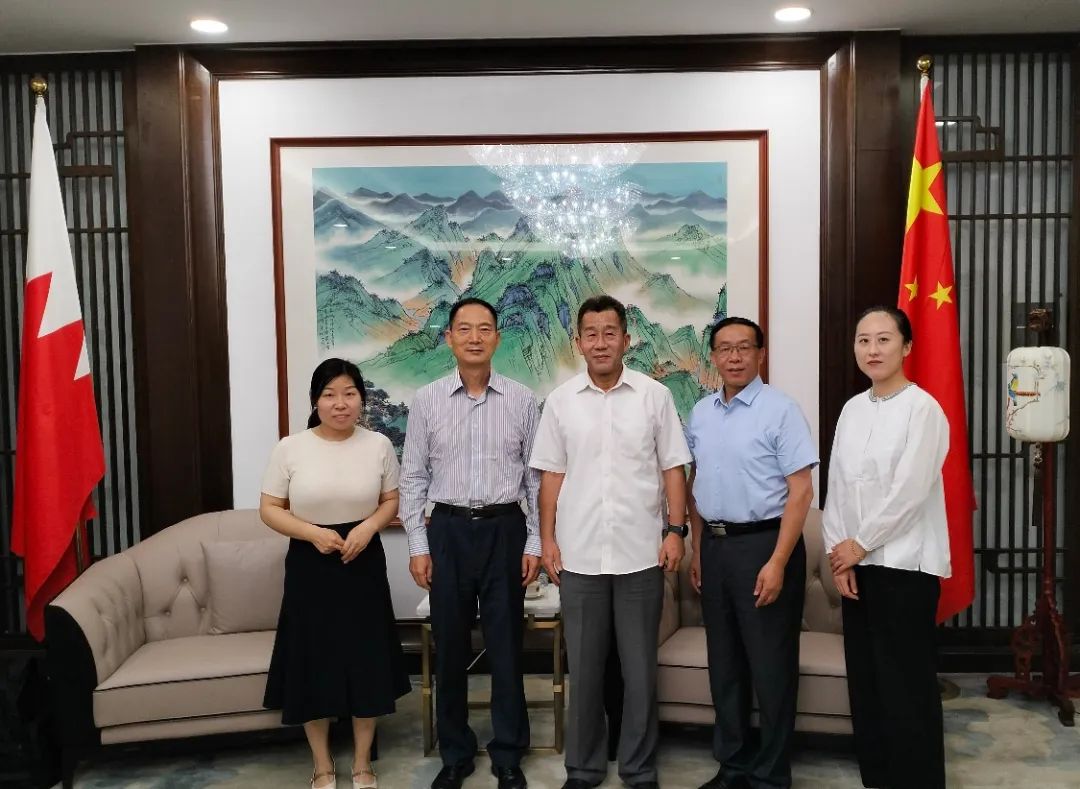
Group Photo (Middle: Ambassador Ni Ruchi)
The IWAAS delegation visited Qatar from June 26 to June 28, 2024. They held a round-table meeting with research fellows of Middle East Council on Global Affairs (ME Council) on "China-Arab Relations and China-Qatar Technology Innovation Cooperation". Professor Li Xinfeng highlighted Chinese President Xi Jinping's keynote speech at the opening ceremony of the 10th Ministerial Conference of the China-Arab States Cooperation Forum, expecting that China and Qatar would enhance cooperation in technology and energy. Adel Abdel Ghafar, Director of the Foreign Policy and Security program at ME Council made an introduction to the ME Council, adding that energy transition and technology innovation are among the key topics of the ME Council, and he hoped to push forward joint research and cooperation with China in these areas. The discussion also covered hot topics such as China-Arab relations, China's Middle East policy and China's role in Africa’s peace and security affairs.
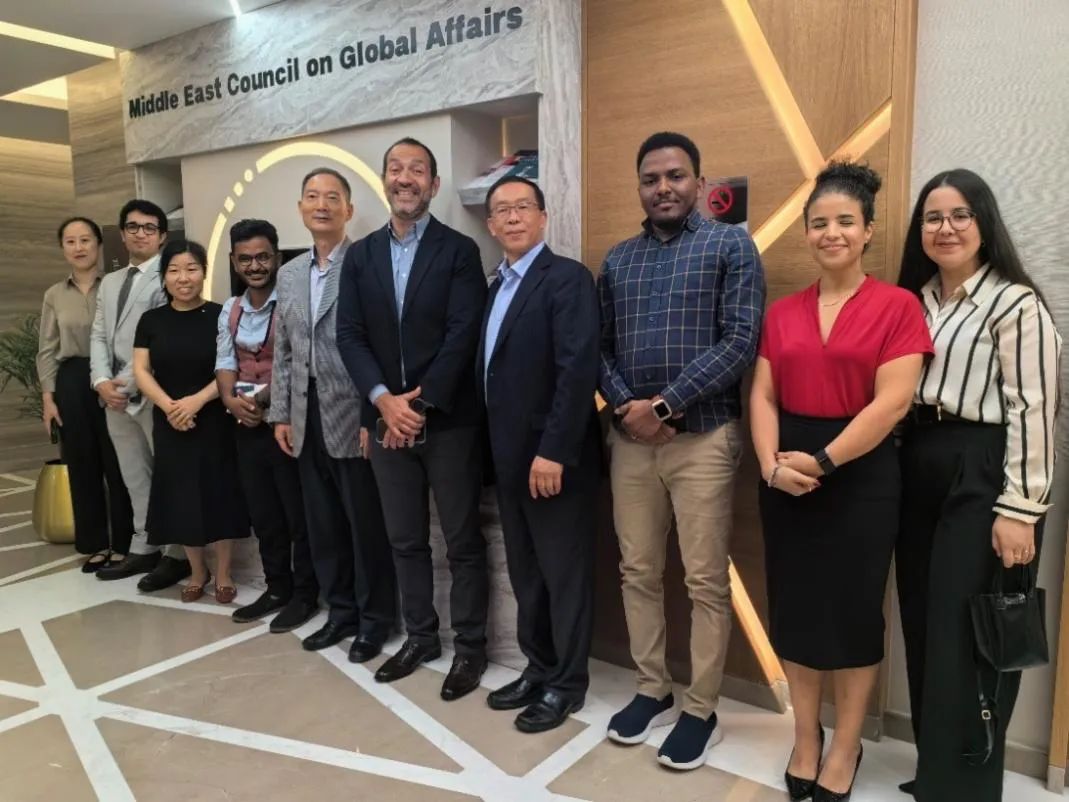
Group Photo
The delegation also visited the Chinese Embassy in Qatar, and met with Chinese Ambassador to Qatar Cao Xiaolin and Economic and Commercial Counsellor Yang Song. Ambassador Cao provided insights into Qatar's culture, politic and economic development, and expressed his expectation for further exchanges between think tanks of China and Qatar. Counsellor Yang talked about China-Qatar cooperation in trade, energy, infrastructure finance and the business operation of Chinese enterprises in Qatar.
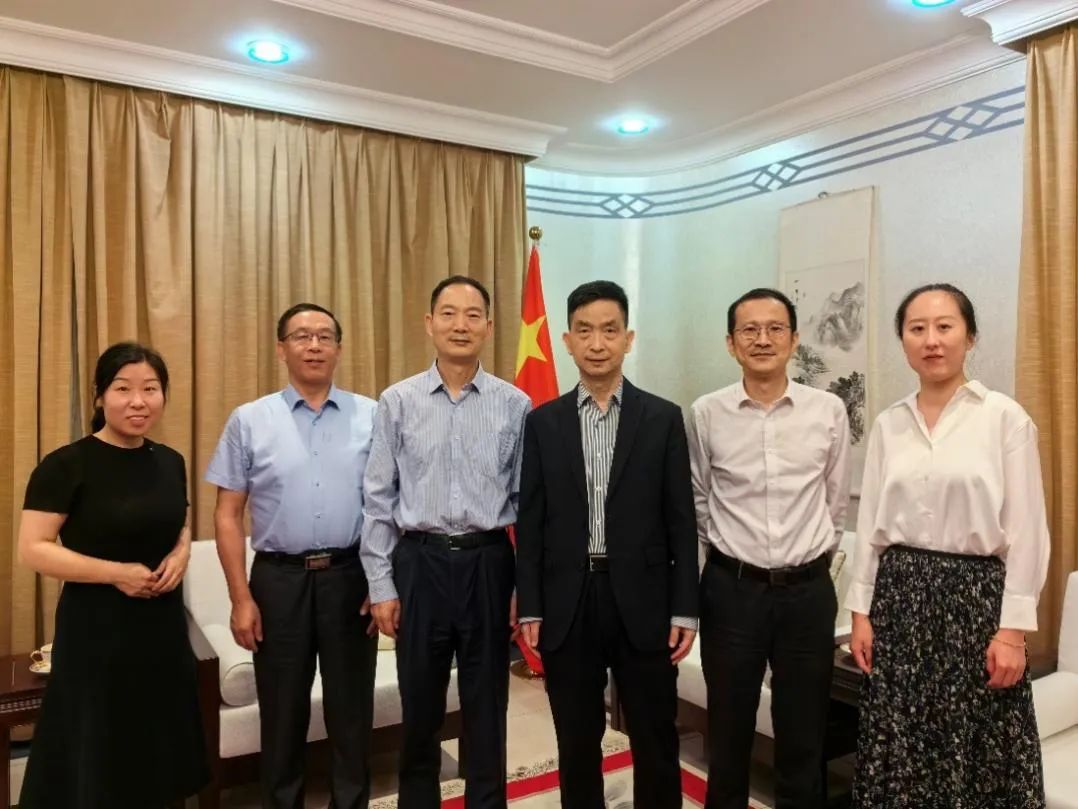
Group photo (the 3rd right: Ambassador Cao Xiaolin; the 2nd right: Counsellor Yang Song)
In addition, the delegation visited the China Railway Construction Corporation International (CRCCI), Qatar Branch Office where they were warmly welcomed by Deputy General Managers Zeng Tao and Meng Xiangmin; Zhang Kun, Construction Manager of the DN071 Project; and Ding Yanbing, Safety Director of the DN071 Project. The delegation has learned about the business operation of CRCCI in the Middle East, particularly the DN071 road and infrastructure project. Accompanied by Zhang Kun and Ding Yanbing, the delegation visited the DN071 project site in one of the residential areas of Qatar. The CRCCI is also the constructor of the Lusail Stadium, the main stadium for 2022 World Cup, which has now become a new dazzling landmark in Qatar.
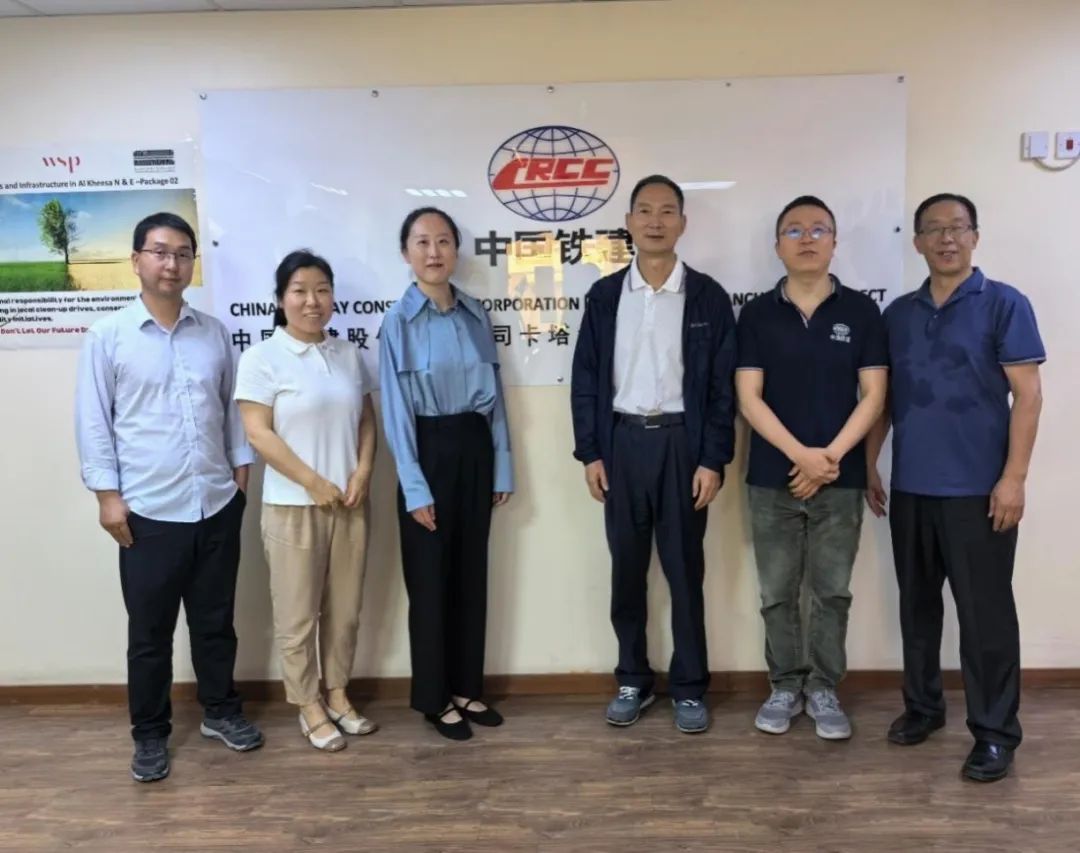
Group photo (the 2nd right: Zeng Tao, the 1st left: Zhang Kun)
The delegation visited Iran from June 29 to July 1, 2024, and co-hosted a seminar on "Opportunities and Challenges of China-Iran Cooperation" in Tehran with the Institute for Political and International Studies (IPIS) of Iran’s Ministry of Foreign Affairs. Professor Li Xinfeng and Khalil Shirgholami, Deputy Director of the IPIS delivered speeches. Professor Li highlighted the importance of China-Iran cooperation in the new era, and said that as national think tanks of China and Iran, the IWAAS and IPIS should strengthen cooperation to push forward people-to-people exchanges between the two sides. Khalil Shirgholami spoke on promoting mutual understanding through international seminars and joint research. Mohammad Keshavarz Zadeh, former Iranian ambassador to China; Fereidoun Haghbin, former Iranian ambassador to Australia; Nabi Sonboli, senior research fellow of IPIS, and IWAAS research fellow Yu Guoqing also delivered keynote speeches. The seminar was moderated by Dr. Alireza Gholipour, Director of the IPIS Asia Research Center, with more than 20 Iranian experts and scholars engaging in in-depth discussions on topics such as opportunities and challenges of China-Iran cooperation and shaping a new regional order in the Middle East.

Speakers at the seminar (the 1st right: Dr. Alireza Gholipour, the 2nd right: Khalil Shirgholami)
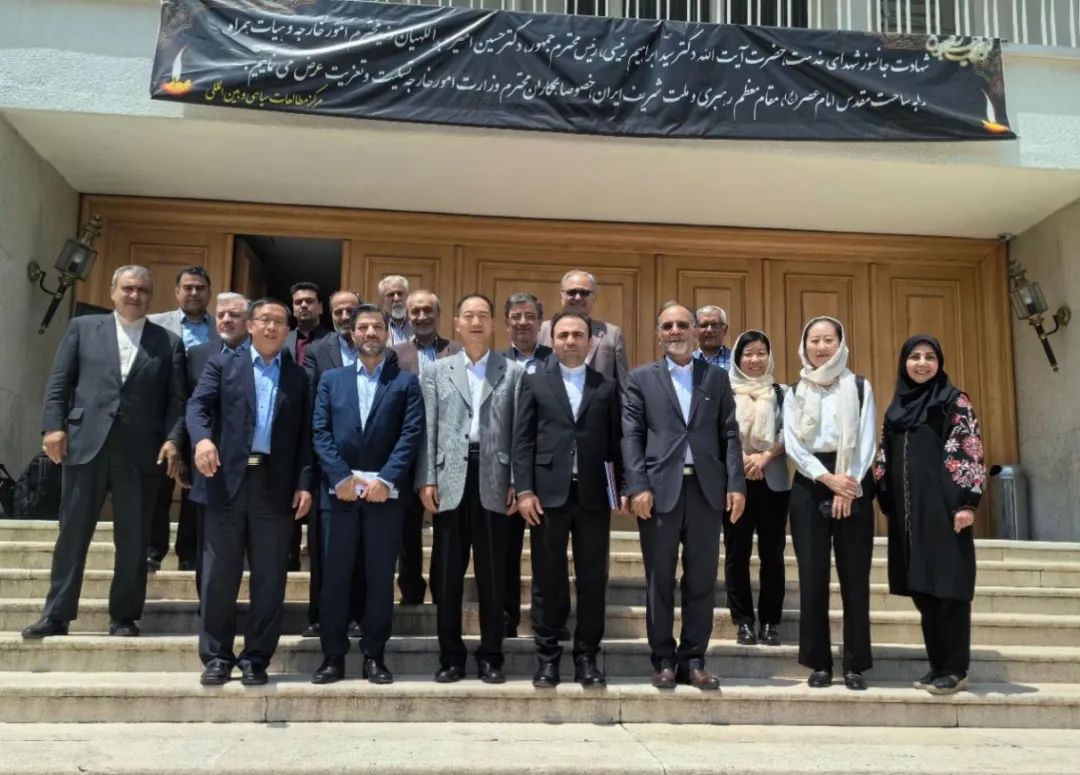
Group photo
The delegation also visited the University of Tehran (UT), and held a round-table meeting with officials of UT on "Communication and Cooperation between Chinese and Iranian Think Tanks" . Elham Amin Zadeh, Vice-President of UT and also former Iranian Vice President; Abdolmajid Eskandari, Head of International Cooperation Department of UT and other 10 professors attended the meeting. The scholars covered topics such as West Asian and African Studies, China-Iran cooperation in environmental protection, climate change, artificial intelligence, agricultural technology, hydraulic engineering and communication technology.
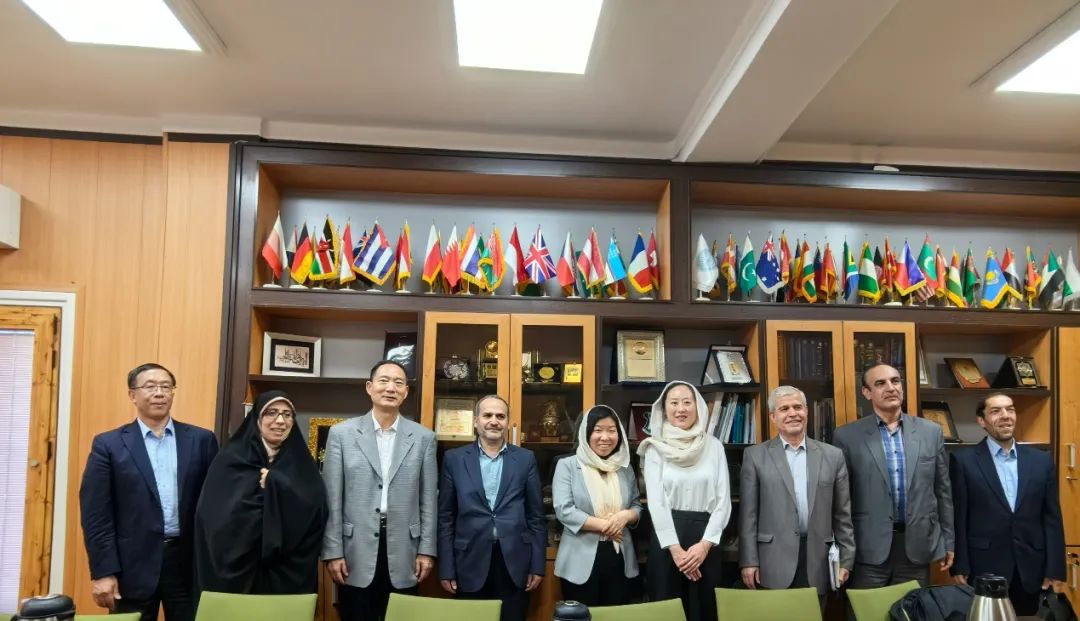
Group photo (the 2nd left: Elham Amin Zadeh)
Moreover, the delegation visited the Tehran Chamber of Commerce, Industries, Mines, and Agriculture (TCCIMA), and held a meeting with TCCIMA officials on “China-Iran Economic and Trade Cooperation”. TCCIMA, with over 30,000 members, is considered as Iran's largest chamber of commerce. Bahman Eshghi, Secretary General of TCCIMA; Ferial Mostoft, Head of Investment Consultation of TCCIMA; and Dr. Fereydoun Verdi Nejad, Manager of China Project attended the meeting. The scholars and experts had a heated discussion on China-Iran economic and trade cooperation, people-to-people exchanges, the situation in West Asia and other topics.
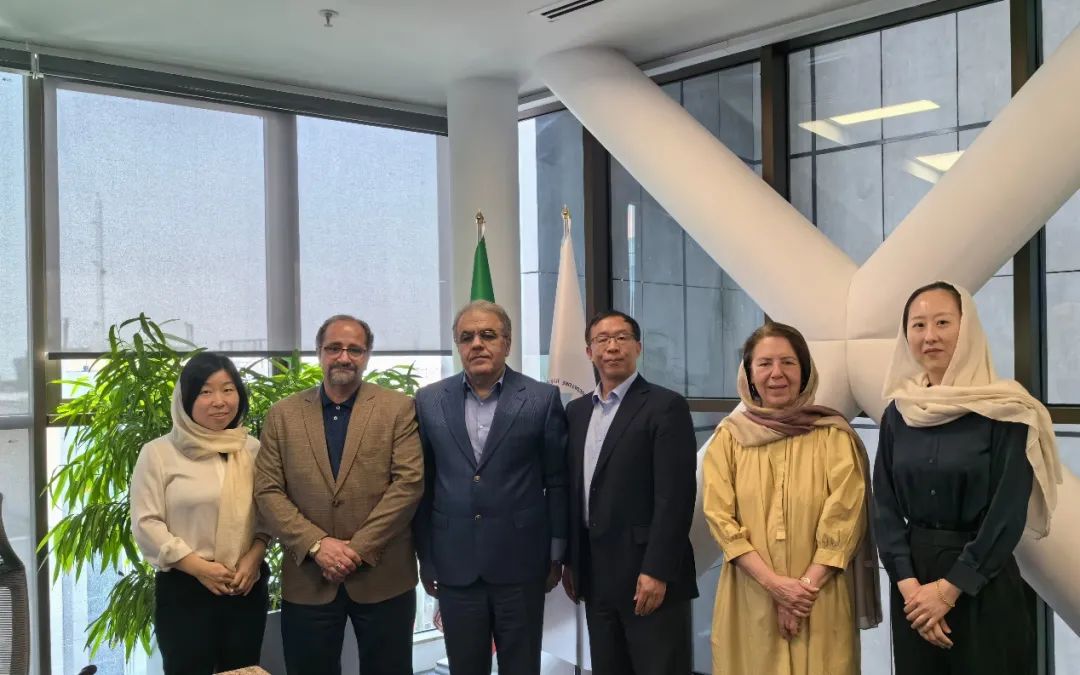
Group photo (the 2nd left: Fereydoun Verdi Nejad; the 3rd left: Bahman Eshghi; the 2nd right: Ferial Mostoft)
The delegation also visited the Chinese Embassy in Iran, and met with Chinese Ambassador to Iran Cong Peiwu. Professor Li Xinfeng was invited to deliver a lecture on the delegation’s academic exchanges in Bahrain, Qatar and Iran. He shared his experience of visiting the three countries, noting the different concerns of those countries in collaboration with China. He reviewed the history of China-Iran exchanges, and emphasized the importance of China-Iran economic and trade cooperation and mutual learning between Chinese and Iranian civilizations. Prof. Li also highlighted Chinese President Xi Jinping's keynote speech at the opening ceremony of the 10th Ministerial Conference of the China-Arab States Cooperation Forum. The IWAAS delegation members and officials of the Chinese Embassy in Iran had a discussion on topics such as energy cooperation between China and the Middle East, and telling China’s story to Iran. Fu Lihua, charge d'affaires of the Chinese Embassy in Iran and Counsellor Feng Chun attended the meeting.
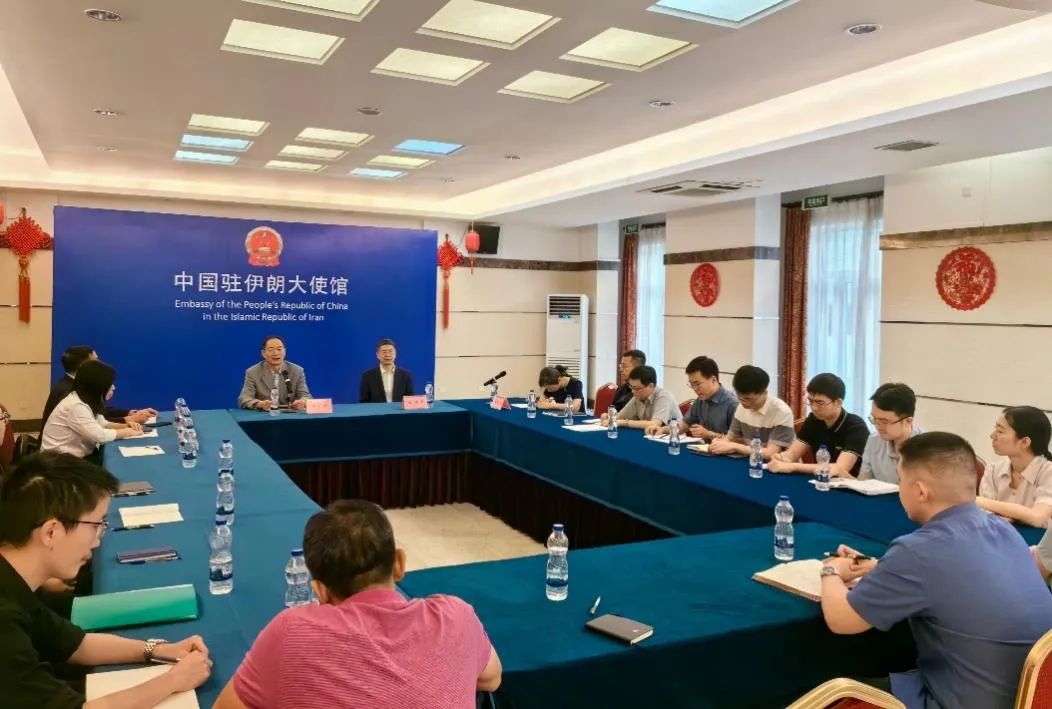
Participants at the lecture
The delegation's visit to the three Middle Eastern countries came not long after the 10th Ministerial Conference of the China-Arab States Cooperation Forum that was held on May 30, 2024 in Beijing. At the opening ceremony of the forum, President Xi Jinping said, China is ready to work with the Arab side to put in place the following "five cooperation frameworks" to step up the building of a China-Arab community with a shared future: a more dynamic framework for innovation, an expanded framework for investment and finance cooperation, a more multifaceted framework for energy cooperation, a more balanced framework for mutually beneficial economic and trade ties, and a broader framework for people-to-people exchanges. Focusing on those five cooperation frameworks and the theme of “Belt and Road Cooperation in Science and Technology Innovation between China and Middle Eastern Countries”, the delegation had insightful communication with universities and institutions in Bahrain and Qatar on common development, so as to join hands in meeting challenges and building a better future. This will help to effectively implement the instructions of the 10th Ministerial Conference of the China-Arab States Cooperation Forum.
In the meantime, the delegation's visit to Iran came at a time of Iran’s presidential election, offering a good opportunity for the delegation members to closely observe the election. Through communication with Iranian think tanks, business and academic sectors, the delegation learned that Iran is ready to collaborate with China in economic, trade, technology, culture and other areas. This will help to promote the implementation of the China-Iran 25-Year Comprehensive Cooperation Agreement, and lend fresh impetus to IWAAS as it continues to make efforts to push forward people-to-people exchanges between China and Iran.


